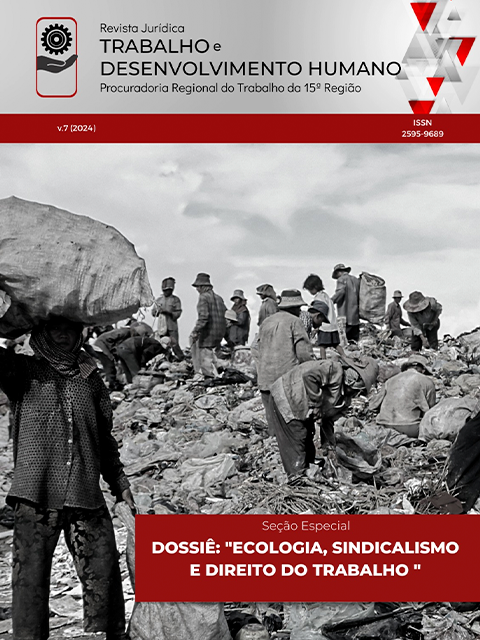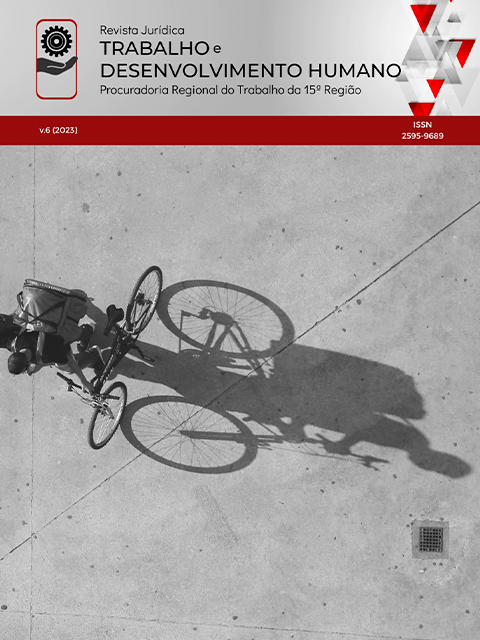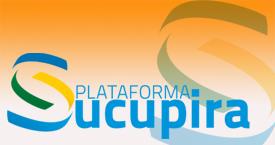Archives
-
Vol. 5 (2022)
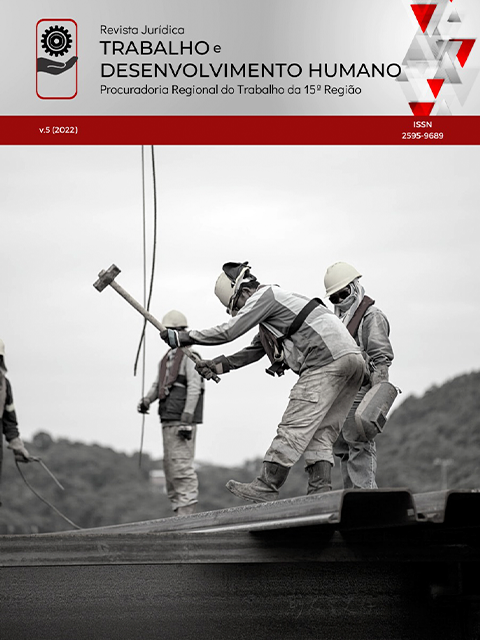
The Legal and Human Development Law Journal is a periodical publication that elects the social phenomenon of labor as an element of human development as its priority. It is dedicated to publishing interdisciplinary studies, theoretical or empirical, related to the legal norms and their application in society. It seeks to foster rigorous reflections that can guide the reduction of material inequalities, with guaranteed access for the entire population to a quality standard of living and the observance of their basic rights, without discrimination on the basis of gender, race, age, or sexual orientation.
Since May 2020 (Volume 3), the RJTDH has adopted the rolling publication mode. Continuous publication or rolling pass is the publication of articles as they are approved. It will be published one volume per year, closed at the end of December, and there will be no more issues or semiannual periodicity.
Thus, the RJTDH invites researchers from Brazil and other countries, whose research is related to the editorial policy of the Journal, to submit scientific articles and reviews for evaluation, with a view to publication in the current year (v. 5, 2022).
Check the rules for submissions and the guidelines for authors.
-
Vol. 4 (2021)

The Revista Jurídica Trabalho e Desenvolvimento Humano - Revista da Procuradoria Regional do Trabalho da 15ª Região (RJTDH) has successfully concluded its fourth volume (2021), despite the vicissitudes and challenges that have continued to plague research activities and the field of scientific publications, especially works in the social sciences and applied social sciences.
This volume maintains RJTDH's editorial profile of interdisciplinarity and topical reflections on the world of work, presenting manuscripts on hot topics, with studies based on different methodologies and approaches, from dogmatic to empirical. The translations section once again featured relevant writings, the content of which deserves to be more widely disseminated in Portuguese.
It is also important to note that the RJTDH's continuous flow submission and publication system was consolidated in 2021, proving to be interesting and respectful of the temporality of the analyses, directly linked to the expected contemporaneity of the publication of the studies with the actuality of the social and legal phenomena examined, thus contributing to the necessary dissemination of information and qualified debates in times of disinformation.
We therefore invite you to read the entirety of Volume 4 and wish you a fruitful reading.
The Editorial Team
-
Vol. 3 (2020)
EDITORIAL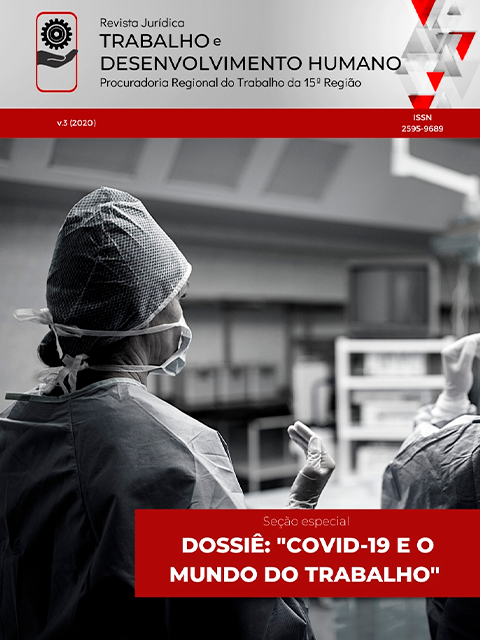
The year 2020 enters history as one in which a pathogen agent invisible to the naked eye places the preservation of the human species conditioned to political decisions and private behaviors that are based on solidarity and empathy. The unprecedented technological advance, which occurred with the informational revolution established after the advent of the Internet, although it was already transforming the means of production (see the so-called Industry 4.0) and intersubjective relations, paradoxically, on the one hand, facilitated the hyperdissemination of the new Coronavirus on a global scale, through the wide and diffuse network of intra- and inter-frontier mobility, and, on the other hand, is being fundamental to the advent of strategies for tracking, control and innovation in terms of treatment and immunization.
This unprecedented health crisis has attacked the capitalist mode of production at its core, by making it difficult or even interrupting the expenditure of the labor force within productive processes of different natures, forcing new forms of labor to be adopted, many of which are mediated by technological alternatives whose implementation has accelerated.
As it could not be otherwise, the state of affairs posed emergency regulations, which, in the field of labor, sought to pave the way for the resumption of productivity, despite the unexpected and little controlled risks to human existence.
In addition, the Covid-19 pandemic also left even more to show structural inequalities of an economic and cultural nature and previous crises of the representative political system, proving that Coronavirus is not a democratic agent, either in the sense of the consequences experienced by the people or in relation to its potential to unite political and ideological currents due to the urgency of preserving life. The millions of Covid-19 deaths experienced on the planet are the lamentable portrait of a global management of the pandemic that can be classified as ineffective, to say the least.
In this environment, labor relations and labor law have experienced complex situations of challenges, setbacks and achievements that should be better examined over time, but which, above all, demonstrate the permanence of the centrality of living work for the prevailing societal model and, even more, for the maintenance of the reproduction of human life.
In this scenario, despite the serious difficulties imposed, the entire team of the Labor and Human Development Law Jornal has remained firm in its intention to offer a qualified, plural and interdisciplinary scientific space for reflections on the world of work, striving to ensure that the historical exceptionality in progress does not impede the continuity of the fulfillment of this mission. In fact, it was understood that, without prejudice to the continuous flow of articles, the spirits should be redoubled in order to contribute to the thinking of the work in a pandemic context, which is proposed with the edition of the Special Dossier Section "Covid-19 and the World of Work", brilliantly organized, at the invitation of Cristiano Paixão, research professor at the University of Brasilia and member of the Federal Labor Prosecution Office.
The closing of volume 3 of RJTDH in December 2020, first after the adoption of the continuous publication system (rolling pass), with the quality of the work and multiplicity of themes presented, comes to justify the choices and the sacrifices assumed.
Finally, RJTDH thanks, immensely, all the authors for believing in our publication vehicle and all the evaluators who have graciously spent their time and knowledge to build the volume that now presents itself to the public in its entirety.The Editorial Team
-
Revista Jurídica Trabalho e Desenvolvimento Humano - Vol. 2, n.2Vol. 2 No. 2 (2019)
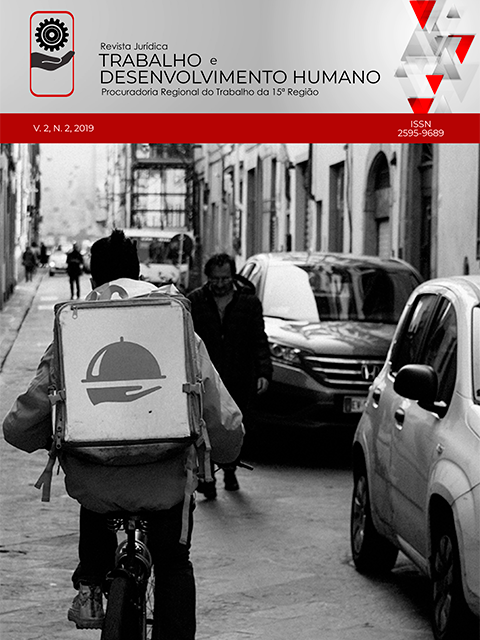
The Revista Jurídica Trabalho e Desenvolvimento Humano - Revista da Procuradoria Regional do Trabalho da 15ª Região (RJTDH) reaches its third edition with the firm purpose of consolidating itself as a vehicle for the dissemination of qualified knowledge on issues related to the world of work and human rights, produced on the basis of interdisciplinary scientific studies by national and international authors, approved after submission to the double-blind peer review system.
In this issue we offer reflections on different fields of labor relations, all tackling current issues. The writings deal with comparative law on the control of conventionality and arbitration in labor disputes, the intensification of job insecurity due to legislative reforms, economic neoliberalism, workplace accidents in the electricity sector, the economic, social and legal impacts of the so-called Fourth Industrial Revolution, reflections on the advances and setbacks of diversity in the labor market and, finally, the admissibility of illegal evidence and due process of law.
In short, this is an issue full of topical issues, carefully and scientifically assessed by experts. Have a good read!
The Editorial TeamTranslated with DeepL.com (free version)
-
Dossier "The Meaning and Impacts of Labor Reform on the World of Work"Vol. 2 No. 1 (2019)
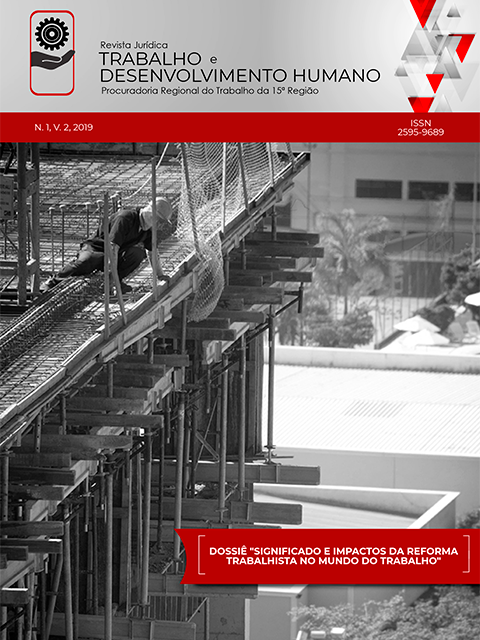
Since its first edition, the Labor and Human Development Law Journal has been guided by the purpose of offering a space for the publication of quality national and international interdisciplinary scientific studies on topics related to labor relations, thought from the perspective of human and social development, and with a view to contributing to the improvement of theoretical reflections and practical actions related to the legal field and the world of work.
In this line, in this first issue of the second volume of the journal, we present the Special Dossier "The Meaning and Impacts of Labor Reform on the World of Work", organized by invitation of Professors Dr. Márcio Túlio Viana (PUC-MG) and Dr. José Dari Krein (UNICAMP - CESIT), which, in a presentation text, pave the way for the subsequent nine scientific articles written by researchers from different parts of the country and abroad, all approved after submission to the double-blind peer review system.The Dossier, as presented by its organizers, contemplates discussions on the legal, social and economic meanings of Labor Reform in Brazil, showing, for example, that despite the discourse that tried to justify it, the economy continues to walk sideways, including the fall in the income mass. And the labor market, also for this reason, continues its trajectory - which began with the 2015 crisis - of worsening employment indicators and the formalization of labor contracts. Thus, it is possible to state scientifically that, besides denying the arguments and theses of its propagators, the reality of the reform points to the advance of labor precariousness and vulnerability of workers.
On the other hand, and with the same objective of incorporating different perspectives, we do not limit ourselves, in this collection, to collect research and studies made in our territory. Always aware of the double blind review criteria, we have selected excellent texts from foreign colleagues, who - by happy coincidence - all carry in their veins the same Latin blood that contaminates us, and therefore carry in their hearts sensitivities similar to ours. These are reflections that focus on the meaning and impact of labor reforms and the processes of labor precariousness in countries such as Colombia, Mexico and Spain, highlighting points of approach and distance with the Brazilian Labor Reform.
The Regional Labor Prosecutor's Office of the 15th Region continues, with this Journal, in its mission to build a channel for the dissemination of qualified knowledge aimed at the entire community that proposes to think about the world of labor under a humane and solidary bias.
Have a great reading!
The Editorial Team -
Revista Jurídica Trabalho e Desenvolvimento Humano - Edição InauguralVol. 1 No. 1 (2018)

The Labour and Human Development Legal Journal was created with the purpose of offering a space for the publication of quality national and international interdisciplinary scientific studies on themes related to labour relations, from the perspective of human and social development, and with a view to contributing to the improvement of theoretical reflections and practical actions related to the legal field and related to the world of labour.
Along these lines, this first issue of the first volume of RTDH presents nine scientific articles written by researchers from different parts of Brazil and abroad, and approved after submission to the double-blind peer review system. The studies deal with various subjects, from law application techniques to occupational health and safety issues, including reflections on work performed through digital platforms, analysis of Brazilian jurisprudence on slave labor, and existential damages in the labor world. In short, it is an edition permeated with current issues, examined with acuity by specialists.
The Labour Prosecution Office of the 15th Region inaugurates, with RTDH, what it intends to be a channel for the diffusion of qualified knowledge directed to the entire community that intends to think the world of labor under a human and solidary perspective.
Enjoy your reading!
The Editorial Team

